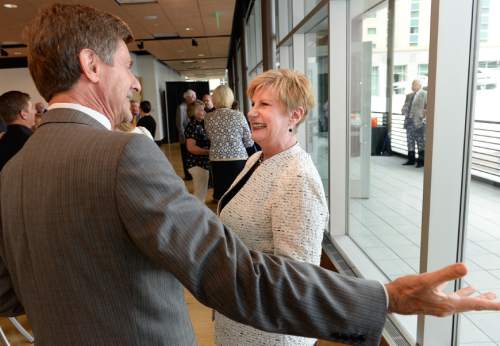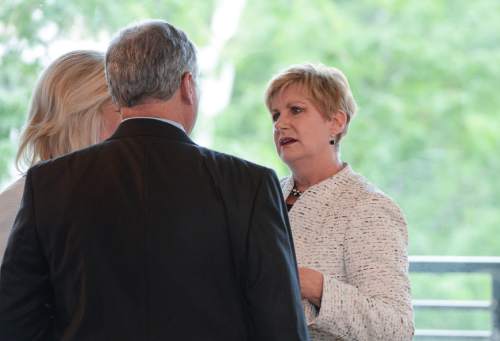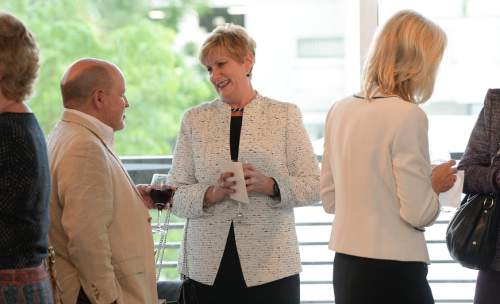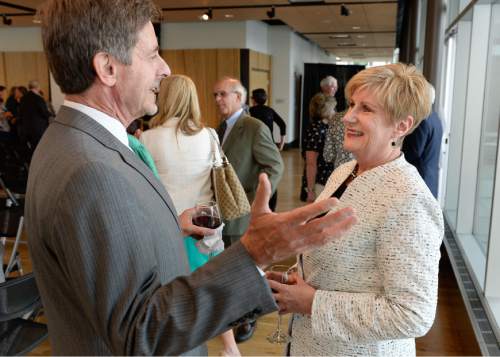This is an archived article that was published on sltrib.com in 2015, and information in the article may be outdated. It is provided only for personal research purposes and may not be reprinted.
When Deborah Bayle was first asked to consider becoming president and CEO of the United Way of Salt Lake, her response was quick and emphatic.
"No. No. No," said Bayle. "I didn't like United Way."
Bayle had more than a few reasons: At the time, the agency's reputation was suffering. Funding partners and grant recipients alike were disgruntled and had been poorly treated.
Donations were about half of what they had been at their peak in 1996 and the organization needed an overhaul, from its culture to its fiscal accountability and policies.
After taking a closer look, Bayle, had a change of heart.
"What I saw was an organization that had the potential to be an agent of change for people in our community," she said. "I looked at who was involved and what they were already doing in the community and thought, 'I could make it better.' "
What came next was a 16-year journey that transformed the United Way of Salt Lake (UWSL) from an agency that essentially passed out money to charities into one that focuses its resources on — and expects accountability from — programs that change the lives of Utah's low-income kids and their families through education and access to social services.
The innovative approach has garnered national attention and accolades for the UWSL and Bayle, who retired from the agency on July 1 but is continuing to help new CEO Bill Crim with the transition this month.
"Without Deborah's influence, United Way of Salt Lake would not be the organization it is today," said board chair Allen Alexander, CEO of Utah-based Savage, said in a statement when Bayle announced her retirement plans. "Because of her vision and hard work, our community will be a better place for years to come."
—
When appointed in 1999, Bayle had been the head of the Utah chapter of the Red Cross for three years, a job she took after a 20-year career at the Salt Lake Chamber, eventually rising to serve as its chief operating officer. She has served on countless state and community boards, was director of the Federal Reserve Bank of San Francisco's Salt Lake City branch and chaired the Utah Nonprofits Association.
Those who know her say Bayle has keen administrative and financial management skills and the wisdom to surround herself with talented staff members and trust them to perform. She is also, admirers say, a generous mentor and a leader with a clear vision, who is unwavering once she is committed to a path.
"I think she appreciates the role that everybody else plays," said Linda Childears, CEO of the Denver-based Daniels Fund, which last year committed $5 million to UWSL programs. "She knows what they bring to the table and she knows how to make the orchestra sound good together."
Raised in Ogden by middle-class parents, one of Bayle's first jobs was working at the social service agency United Fund, a precursor to the United Way. Bayle's mother was the fund's office manager, so as a teen Bayle saw firsthand the inequities around her. At home, Bayle also was influenced by her father, whom she said wasn't shy about sharing bigoted or disparaging opinions of others.
"We called him Archie Bunker," said Bayle. "It bothered me a lot, the things he said, even when I was very young."
Bayle's social conscience was pricked again at age 22, when she was living in Durham, N.C., and working at Duke University while her then-husband attended law school. At the fringes of campus, just behind the couple's apartment, sat a row of ramshackle homes on stilts where the area's black families lived. It was poverty, segregation and racism on a scale that Bayle said she couldn't ignore.
"No one mentioned it," Bayle said. "I worked at the university and everybody in my office was white and they really were just so discriminatory."
Years later, those early impressions of inequality would lead Bayle away from the Chamber and into the nonprofit sector. They would guide her again when it became clear that the United Way needed new fundraising models and focus to both invigorate the agency and have greater community impact.
"We had great talent, great leadership, great people on our board, great support from the community and great staff, and yet the problems in our community were getting worse," she said.
—
Influenced by the work of the Harlem Children's Zone and the Children's Aid Society, Bayle and her team focused on education, seeing it as the way to help Utah's low-income children catch up with their peers and break the cycle of generational poverty.
UWSL proposed using a collective impact model: using data to select specific goals, harnessing existing community talent and programs and holding partners accountable for measurable outcomes.
"It was a hard sell," said Bayle. "People hate change. The nonprofit sector has been used to working in silos, with everybody doing their own thing. We were asking for people to work toward a common goal … that's not the norm and it's hard work."
Some worthy causes that had long counted on UWSL as a "community chest" were cut off. Many in Utah's nonprofit community were less than enthusiastic, said Karen Crompton, who led the research and policy group Voices for Utah Children for 13 years.
"As a nonprofit, anytime you lose funding, it's troubling," said Crompton, who now works for Salt Lake County. "Often there's not enough time to pivot and figure out how to replace it."
Another concern: United Way seemed destined to compete with other Utah nonprofits doing similar work at a time when the funding pool was shrinking, Crompton said.
"I think many people in and out of the nonprofit community questioned whether this was the right decision for a United Way," said Crompton.
For her part, Compton could see how using resources to support a shared goal could "move the needle on a larger scale."
"As nonprofits, we are all necessary, but none of us is sufficient," she said. "You need everybody to come together."
And that's the hard part, Crompton notes.
"That doesn't mean you can't still be true to parts of your own work or mission, but to a certain extent it does mean setting aside your individual passions to work on this bigger image."
—
Voices for Utah Children embraced the model and secured United Way support for its study of federally funded preschool in Granite School District.
The results convinced the United Way to fund an expansion, allowing an additional 600 children ages 3 and 4 to attend.
The project has been privately funded with a $7 million grant from Goldman Sachs and the JB Pritzker Family Foundation, in a first-of-its-kind social impact bond, a loan that will be repaid only if the students who might otherwise need expensive special education programming avoid remediation.
Test scores show the approach is working, Granite School District Superintendent Martin Bates said. Reading proficiency is up among low-income third graders who participated in a preschool pilot program between 2006 and 2009, putting those kids on track to make it to high school graduation.
That's a game changer for kids growing up in poverty, who typically start kindergarten with small vocabularies and other skill deficiencies, said Bates. Low-income kids can be expected to need special education services at a rate higher than the 8 to 12 percent typically seen in the general school population, he said.
Granite's low-income kids in the programs now need services at rates equal to their fellow students.
"It has nothing to do with intelligence; it has everything to do with opportunity," said Bates. "We are reducing the gap. And the 'wow' is that we've taken poverty out of the equation by servicing those kids in poverty."
Some district schools have joined UWSL's community schools network, which provides after-school programs for youth and access to health care, job training and other social services that benefit families — without adding expense or workload to teachers and principals.
Through the process, Granite has formed critical relationships with local government, police, state agencies and the business community, Bates said.
"United Way has become this backbone entity or sinew, this connective tissue that makes it possible," he said. "Collaboration is time intensive and they've worked that out."
—
The approach overall was "a huge gamble," said Bayle. But the early results were so promising that by 2011, the UWSL board voted to make it the agency's mission.
"We've had a lot of pushback and one major foundation here who said, 'It's not broke, don't fix it, go back to the way you were doing it,' " she said. Although she lost that foundation's support — she won't name the entity — it has since come back to the fold.
"I think her legacy will be that she shaped a new direction for United Way that really has become a model for United Ways across the country," said Crompton. "They've become a beacon of how a nonprofit can really effect long-lasting change."
Daniel's Fund CEO, Childears, agrees. Her agency reviews funding requests from nonprofits in Colorado, New Mexico, Utah and Wyoming, and few, she said, can do what UWSL is doing: provide accountability through data-based results and demonstrate broad community investment.
"That's a funder's dream," said Childears, adding that the 15-year-old Daniels Fund had not historically contributed to United Way-based programming.
Although she leaves UWSL with some sense of sadness, Bayle said she mostly has a deep sense of gratitude for a lifetime of opportunities to help the community.
Bayle will spend part of her retirement helping her daughter balance her own busy career and family by doing grandmother duty for her 12-month- and 4-year-old grandchildren. It's the same support Bayle said she had from her mother and she wants to "pay it forward."
She also plans to remain active on community boards and will travel for the United Way, consulting and teaching the collective impact model to others.
"I want to spread what we are doing," Bayle said. "Too many are still in the old mode. United Way is such a big brand, it raises so much money and if that money is directed … we could change this country."









